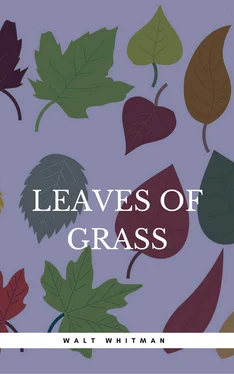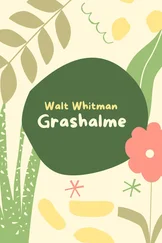Walt Whitman - Leaves of Grass
Здесь есть возможность читать онлайн «Walt Whitman - Leaves of Grass» — ознакомительный отрывок электронной книги совершенно бесплатно, а после прочтения отрывка купить полную версию. В некоторых случаях можно слушать аудио, скачать через торрент в формате fb2 и присутствует краткое содержание. ISBN: , Жанр: Языкознание, Критика, на английском языке. Описание произведения, (предисловие) а так же отзывы посетителей доступны на портале библиотеки ЛибКат.
- Название:Leaves of Grass
- Автор:
- Жанр:
- Год:неизвестен
- ISBN:9782377930524
- Рейтинг книги:4 / 5. Голосов: 1
-
Избранное:Добавить в избранное
- Отзывы:
-
Ваша оценка:
- 80
- 1
- 2
- 3
- 4
- 5
Leaves of Grass: краткое содержание, описание и аннотация
Предлагаем к чтению аннотацию, описание, краткое содержание или предисловие (зависит от того, что написал сам автор книги «Leaves of Grass»). Если вы не нашли необходимую информацию о книге — напишите в комментариях, мы постараемся отыскать её.
Leaves of Grass — читать онлайн ознакомительный отрывок
Ниже представлен текст книги, разбитый по страницам. Система сохранения места последней прочитанной страницы, позволяет с удобством читать онлайн бесплатно книгу «Leaves of Grass», без необходимости каждый раз заново искать на чём Вы остановились. Поставьте закладку, и сможете в любой момент перейти на страницу, на которой закончили чтение.
Интервал:
Закладка:
First be yourself what you would show in your poem—such seems to be this man’s example and inferred rebuke to the schools of poets. He makes no allusions to books or writers; their spirits do not seem to have touched him; he has not a word to say for or against them, or their theories or ways. He never offers others; what he continually offers is the man whom our Brooklynites know so well. Of pure American breed, large and lusty—age thirty-six years, (1855,)—never once using medicine—never dressed in black, always dressed freely and clean in strong clothes—neck open, shirt-collar flat and broad, countenance tawny transparent red, beard well-mottled with white, hair like hay after it has been mowed in the field and lies tossed and streaked—his physiology corroborating a rugged phrenology 1 1 Phrenological Notes on W. Whitman , by L. N. Fowler , July , 1849.—Size of head large, 23 inches. Leading traits appear to be Friendship, Sympathy, Sublimity, and Self-Esteem, and markedly among his combinations the dangerous faults of Indolence, a tendency to the pleasures of Voluptuousness and Alimentiveness, and a certain reckless swing of animal will. Amativeness large, *6; Philoprogenitiveness, 6; Adhesiveness, 6; Inhabitiveness, 6; Concentrativeness, 4; Combativeness, 6; Destructiveness, 5 to 6; Alimentiveness, 6; Acquisitiveness, 4; Secretiveness, 3; Cautiousness, 6; Approbativeness, 4; Self-Esteem, 6 to 7; Firmness, 6 to 7; Conscientiousness, 6; Hope, 4; Marvellousness, 3; Veneration, 4; Benevolence, 6 to 7; Constructiveness, 5; Ideality, 5 to 6; Sublimity, 6 to 7; Imitation, 5; Mirthfulness, 5; Individuality, 6; Form, 6; Size, 6; Weight, 6; Color, 3; Order, 5; Calculation, 5; Locality, 6; Eventuality, 6; Time, 3; Tune, 4; Language, 5; Causality, 5 to 6; Comparison, 6; Suavitiveness, 4; Intuitiveness, or Human Nature, 6. * The organs are marked by figures from 1 to 7, indicating their degrees of development, 1 meaning very small, 2 small, 3 moderate, 4 average, 5 full, 6 large, and 7 very large.
—a spirit that mixes cheerfully with the world—a person singularly beloved and looked toward, especially by young men and the illiterate—one who has firm attachments there, and associates there—one who does not associate with literary people—a man never called upon to make speeches at public dinners, never on platforms amid the crowds of clergymen, or professors, or aldermen, or congressmen—rather down in the bay with pilots in their pilot-boat—or off on a cruise with fishers in a fishing smack—or with a band of loungers over the open grounds of the country—fond of New York and Brooklyn—fond of the life of the great ferries, or along Broadway, observing the endless wonders of that thoroughfare of the world—One whom, if you would meet, you need not expect to meet an extraordinary person—one in whom you will see the singularity which consists in no singularity—whose contact is no dazzle or fascination, nor requires any deference, but has the easy fascination of what is homely and accustomed—of something you knew before, and was waiting for—of natural pleasures, and well-known places, and welcome familiar faces—there you have Walt Whitman, the begetter of a new offspring out of literature, taking with easy nonchalance the chances of its present reception, and, through all misunderstandings and distrusts, the chances of its future reception—preferring always to speak for himself rather than have others speak for him.
From the Christian Spiritualist
LEAVES OF GRASS.
Carlyle represents a cotemporary reviewer taking leave of the Belles-Lettres department somewhat in this abrupt manner: “The end having come, it is fit that we end—Poetry having ceased to be read, or published, or written, how can it continue to be reviewed? With your Lake Schools, and Border-Thief Schools, and Cockney and Satanic Schools, there has been enough to do; and now, all these Schools having burnt or smouldered themselves out, and left nothing but a wide-spread wreck of ashes, dust, and cinders—or perhaps dying embers, kicked to and fro under the feet of innumerable women and children in the magazines, and at best blown here and there into transient sputters, what remains but to adjust ourselves to circumstances? Urge me not,” continues this desperate Literateur, “with considerations that Poetry, as the inward Voice of Life, must be perennial, only dead in one form to become alive in another; that this still abundant deluge of Metre, seeing there must needs be fractions of Poetry floating, scattered in it, ought still to be net-fished, at all events, surveyed and taken note of. The survey of English metre, at this epoch, perhaps transcends the human faculties; to hire out the reading of it by estimate, at a remunerative rate per page, would, in a few quarters, reduce the cashbox of any extant review to the verge of insolvency.”
Such is the humorous but essentially truthful picture of the condition and product of the creative faculties during the second quarter of the present century. The great poets, Byron, Shelley, Wordsworth, Goethe, and Schiller, had fulfilled their tasks and gone to other spheres; and all that remained, with few exceptions, were weak and feeble echoes of their dying strains, caught up and repeated by numerous imitators and pretenders. And so has it ever been; the visions and perceptions of one man become the creed and superficial life-element of other minds. Swedenborg is worthy to be enrolled among the master-minds of the world, because he entered for himself into the Arcana of the profoundest mysteries that can concern human intelligences; his great thoughts are revolved, quoted, and represented in all “New Church” publications, but very rarely digested and assimilated by those who claim to be his followers. Still more rare is it to find any receiver of “the heavenly doctrines” determined to enter for himself into the very interiors of all that Swedenborg taught—to see, not the mighty reflections that Swedenborg was able to give of interior realities, but their originals, as they stand constellated in the heavens!
But Divine Providence, leading forth the race, as a father the tottering steps of his children, causes the outward form on which all men are prone to rely, to be forever changing and passing away before their eyes. The seeds of death are ever found lurking in the fairest external appearances, till those externals become the mere correspondences and representatives of interior realities, and then, though enduring as the fadeless garments of the blest, they are ever-varying, as those robes of light change with each changing state. The Coming Age will recognize the profoundest truths in the internal thought of the Swedish sage, while his most tenacious adherents will be forced to admit that, in externals, he often erred, and was not unfrequently deceived. But the discovered error will not only wean them from a blind and bigoted reliance upon frail man, but confirm the sincere lovers of truth in loyalty to her standard. So, also, the Spiritualists are being taught a severe but salutary lesson, that if they will penetrate into the heavenly Arcana of the Inner Life, they must do so by purifying and elevating their own minds, and not by “sitting in circles” or ransacking town and country to find the most “reliable Mediums.” Still no step in human progress and development is in vain; even the falls of the child are essential to its discipline. The mistakes and errors of men are needful while in their present imperfect state. They are to the seekers of truth what trials and losses are to those in the pursuit of wealth; they but enhance the value of the prize, and confirm the devotion of the true aspirant, as frowns rekindle the ardor of lovers.
Moreover, as man must ever enter into the kingdom of a new unfolding truth with the simplicity and teachableness of little children, it is well that the outer form of the old disappear, that the new may stand alone in its place. It seems also to be a Law that when a change entire and universal is to be outwrought, the means preparatory to its introduction shall be equally wide-spreads, and ultimated to the lowest possible plane. Hence the Spiritual manifestations meet the most external minds; and allow even the unregenerate to know by experience the fact and process of Spiritual inspiration; so that skepticism becomes impossible to the candid and living mind. The second step will be, after such have been convinced that Spiritual intercourse is possible, that they learn that it is worse than useless for the purpose of attaining any thing desirable, beyond this conviction—except so far as is orderly and directed, not by the will of man, but of God. But as the old form of poetic inspiration died out with Byron and Shelley, Wordsworth and Goethe, and as the miscellaneous Spirit-intercourse itself, also as quickly passes away, there will, we apprehend, spring up forms of mediatorial inspiration, of which there will be two permanent types. The first and highest, as it seems to us, will be the opening of the interiors to direct influx to the inspiring sources of love and wisdom. The heavens will flow down into the hearts and lives, into the thought and speech of harmonic natures, as the silent dews impregnate the patient earth. Men will live in heaven, hence they must be inspired by that breath of life that fills its ethereal expanse. A second class of Media will be used for the ultimation, for ends of use and in accordance with Laws of Order, of the creative thoughts and hymns, the Epics and Lyrics, of individual Spirits and societies of Spirits. These will be to the former Media as the youthful artist who copies the work of a master to the Angelos and Raphaels, who both design and execute their plans, though they themselves, in their deepest interiors, are instructed and sustained from above.
Читать дальшеИнтервал:
Закладка:
Похожие книги на «Leaves of Grass»
Представляем Вашему вниманию похожие книги на «Leaves of Grass» списком для выбора. Мы отобрали схожую по названию и смыслу литературу в надежде предоставить читателям больше вариантов отыскать новые, интересные, ещё непрочитанные произведения.
Обсуждение, отзывы о книге «Leaves of Grass» и просто собственные мнения читателей. Оставьте ваши комментарии, напишите, что Вы думаете о произведении, его смысле или главных героях. Укажите что конкретно понравилось, а что нет, и почему Вы так считаете.












